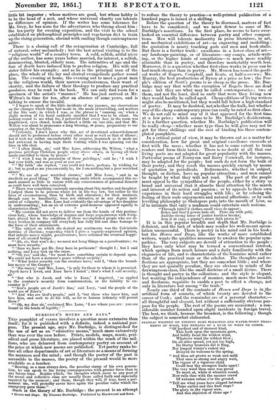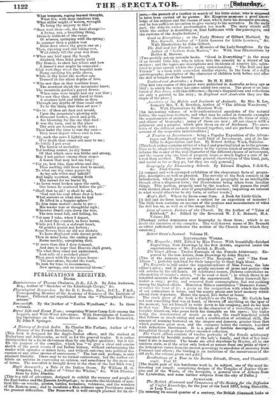BlIBBIDGE'S HOURS AND DAYS. * Tins pamphlet of verses involves a
question more extensive than itself; for it is published with a definite, indeed a national pur- pose. The present age, says Mr. Burbidge, is distinguished for the use of art as an "educative means," much more extensively than was ever the ease before. Prints, models, maps music, peri- odical and prose 'literature, are placed within the reach of the mil- lions, who are debarred from contemporary poetry on account of the price at which- new poems are published. Yet poetry ranks be- fore all other departments of art or literature as a means of forming the manners and the mind ; and though the poetry of the past is accessible to the masses, the poetry of the present would be more available as a teacher.
"Bearing, as a man always does, the peculiar stamp of his own genera- tion, he can speak to his living contemporaries with greater force than to any future time. Besides which, the thoughts which occur to any poet of the moral and reflective class are usually those called forth and especially required by the moment' and these, though they will, if true, have a per- manent- Mie, will: probably never have again the peculiar value which the emergency gave thena":•.• -Such is the theory of Mr. Burbidge : the present is an attempt
* Hours and Days. By Thomas Burbidge. Published by Blackwood and Sons.
to reduce the theory to practice—a well-printed publication of a hundred pages is issued at a shilling. Before the question of the theory be discussed, matters of fact have to be considered; and we must demur to some of Mr. Burbidge's assertions. In the first place, he seems to have over- looked an essential difference between poetry and other composi- tions. Men will tolerate mediocrity in prose literature, in art, and mechanical exhibitions of art—as engraving and modelling : the quotation is musty, touching gods and men and book-stalls. But there is a further truth : excellence in a lower class of art— say landscape-painting, or of literature—say essays, article-writ- ing, or the higher kinds of compilation—is much more readily attainable than in poetry, and therefore marketably worth less. Moreover, it is a question whether first-class works in prose can be had much cheaper than in poetry. Mr. Meson has issued the poeti- cal works of Rogers, Campbell, and Keats, at half-a-crown ; Mr. Murray, the best productions of Byron at a price as low ; the Peo- ple's edition of Scott's poems is as cheap as the prose. Mr. Bur- bidge may say that with the exception of Rogers these are dead men : but they are what may be called contemporaries ; two of them, and not the least, died so early that were they living now they would hardly be called aged. Cheap editions of living writers might also be mentioned, but they would fall below a high standard of poetry. It may be doubted, nokwhether the bulk, but whether any of the cheap contemporaryprose can really be rated as first-class. We do not call to mind any of it that appeared for the first time at a low price ; which seems to be Mr. Burbidge's desideratum. It is a further question, whether Mr. Burbidge's publication will be really cheap—whether more type than he will give may not be got for three shillings and the cost of binding his three contem- plated pamphlets. In a critical point of view, it may be thrown out as a matter for consideration, how far great and original excellence succeeds at first with the mass ; whether it has not to some extent to train readers and form their tastes. There is no doubt at all that our living poets are not adapted for great popularity with the masses. Particular poems of Tennyson and Barry Cornwall, for instance, may be adapted for the people ; but such do not form the bulk of their poetry, and they reach the masses quickly enough by means of quotation in periodicals. Refinements, whether in subject, thought, or diction, have no popular attraction ; and men cannot be taught by what they will not read. The poet of the people must appeal to the sympathies of the people, either by a story so broad and universal that it absorbs their attention by the march and interest of its action and passion ; or by appeals to their own experience in their hard struggles with life or by echoing the feeling of their rude enjoyments and natural affections; or by such levelling philosophy as Shakspere puts into the mouth of Lear, as if to intimate that only a madman could entertain such notions.
"Through tatter'd clothes small vices do appear; Robes and fured gowns hide all. Plate sin with gold, And the strong lance of justice hurtless breaks;
Ann it in rags, a pigmy's straw doth pierce it." It is in this popular breadth and depth that Mr. Burbidge is deficient, and the lack of which may render his well-meant specu- lation unsuccessful. There is poetry in his mind and in his book; but the Hours and Days, like the works of more established writers, wants the qualities necessary to awaken the popular sym- pathies. The very subjects are devoid of attraction to the people : they have only what may be termed a conventional interest, which springs from much leisure and a daily familiarity with the elegancies of life, and is characteristic of the feminine mind rather than of the practical man or the scholar. The thoughts and re- flections are appropriate, but they are somewhat little ; and where they are not quaintly peculiar, they are obvious to minds of the drawingroom class, like the small doctrine of a small divine. There is thought and poetry in the collection; and the style is elegant, but wanting the independence of manner, much more the breadth and freshness, requisite to enable a poet to effect a change, not only in literature but among "the trade."
Nearly one third of the contents of Hours and Days is in,lhe artificial form of sonnets, of which twenty are devoted to the career of Cook ; and the remainder are of a personal character,— all thoughtful and elegant, but without a sufficiently obvious pur- pose for the people. The rest of the poems are occasional; a con- siderable number founded upon slight incidents in foreign travel. The best, we think, because the broadest, is the following ; though the subject is somewhat elaborated.
STANZAS WRITTEN ON FINDING SOME BLEACHED AND WATER-WORN FRAG- MENTS OF WOOD, THE RENLAINS OF A BUSH OF WHIN OR GORSE.
"Of hardiest and of sternest kind, This bush upon the mountain grew, And boldly faced the wildest wind, Whatever wind the wildest blew ; On all sides spread, yet not too high, Its thorny branches did it fling, NOT longed winter's rudest sky Delayed its welcome to the spring.
" And thou art grown so weak and mild
That once so strong and angry wert, The vigour of a vigorous child Could tear thy strongest limbs apart! The very wind thou once was proud To mock at, while it whistled round, Now rolls thee with the meaner crowd Of autumn refuse o'er the ground.
"Tell me what years have slipped between Thine earlier and this final stage ? The glory in thy vigour seen, And this abjection of thine age ?
What tempests, raging beyond thought, What fire, with deep insidious, kiss, What stiller might of waters wrought To bring thy majesty to this ?
"Once wert thou—oh, the fatal change !— A living, yea, a breathing thing, Divinely sentient of the range Of seasons, springing with the spring; In summer thou a golden vest Deist draw above thy green one on ; Then, ripening seed and takingrest, Wait calmly till the year was done.
"When any bird upon thy bough Alighted, thou didat gently yield Thy branch, to show her where and how A linnet's nest might he concealed : Glad wert thou when the boastful mate Hung carolling his pride above, While at thy heart the mother sate Tranced in the anent depths of love.
" Who saw thee in that worthier hour, The sturdiest shrub the mountains knew, The mountain garden's gayest flower, Wheu suus were bright and sky was blue ; Who saw thee then, and dared to think A creature bold and blithe as thou Through any depths of time could sink To be the thing that thou art flow?
"Go to : if thou art dust and mould, Upon the mountain's glowing ride A thousand bushes, green and gold, Are blooming for the one that died : It was thy turn, and in thy place Thy seed are boasting in the sun ;
Thou hadst thy time to run thy race—
They must depart whose race is run.
"Ay, such the saws I lightly say O'er death that comes not near to me; So loftily I put away The horror of mortality.
Yet looking nearer, ye dry bones Of that which once was blithe and strong, May I not gather among these stones A lesson that may last me long?
"For ye, how like, thus white and dry, Thus melting still from dust to mould, To what one day some passer-by As my sale relics may behold ?
And haply murmur, casting forth The morsel for no burial fit, As hewn wood broken upon the earth, Our bones lie scattered before the pit!
"Shall that be all? or shall he add, 'God rest his soul whose dust is here : What sorrows or what sins he had Be lifted in a happier sphere!'
To him some matter—none to me—
His tender tear or thoughtful sigh; Wherever Death cuts down the tree, The tree must fall, and falling, lie.
"Yet may I take, when I depart, At least thy comfort, to have borne, While yet I lived, a stalwart heart, Of gentler graces not forlorn; Some flowers that air did not disdain To have displayed with decent pride; Then in mine hour, the ending pain Borne meekly, unrepining "If more than this I dare demand, And dare to hope that Heaven shall grant, 'Tis what thou canst not understand, Last relic of a perished plant! Thou goest with thy dry bones hence: 'Tis ours alone, beyond the tomb, To look for time to recommence, New springs, and an immortal bloom."



























 Previous page
Previous page